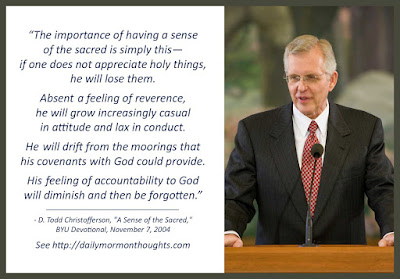"There are many places in the scriptures that counsel mankind to fear God. In our day we generally interpret the word fear as 'respect' or 'reverence' or 'love'; that is, the fear of God means the love of God or respect for Him and His law. That may often be a correct reading, but I wonder if sometimes fear doesn't really mean fear, as when the prophets speak of fearing to offend God by breaking His commandments....
"I submit that fear of the Lord, or what Paul calls 'godly fear' (Hebrews 12:28), should be part of our reverence for Him. We should so love and reverence Him that we fear doing anything wrong in His sight, whatever may be the opinions of or pressure from others. Moroni urges us, 'Begin as in times of old, and come unto the Lord with all your heart, and work out your own salvation with fear and trembling before him' (Mormon 9:27).
"Because the world around us generally ignores God, it is easy for us at times to forget that our responsibility to know and do His will is constant. Most do not realize, or do not believe, that in a future day each of us must account to the Lord for his or her life: thoughts, words, and actions. Working out our own salvation with fear and trembling means striving in the decisions and activities of life day by day to prepare what will be a good accounting.
"Having been blessed to receive what we have received, we can advance spiritually as no other people, but we are also at greater risk than any others. We cannot commit the sins they do without coming under a greater condemnation, for if we sin, we sin against a greater light. We cannot trifle with the sacred things committed to our care and be considered innocent as those who know not God.
"God is feeling after us to see if we will prove faithful, and if we have the integrity and sensitivity to honor sacred things, we will receive even more. But if not, our blessings will turn to our condemnation."
- D. Todd Christofferson, "A Sense of the Sacred," CES Fireside, 7 November 2004
Click here to read the full article
Coming to understand our relationship to God is a crucial task for this life. Elder Christofferson mentions feelings we might have for Him, including respect, reverence, and love. But he also discusses the concept of fear — particularly the idea of "fearing to offend God by breaking His commandments." This kind of "godly fear" is really expanded reverence, and is very different from the concept of "fear" that is most common in the world.
All we do should truly, ultimately be motivated by love for God and love for one another. What a powerful concept!
And to those who have greater light and understanding, there is greater responsibility and accountability. Elder Christofferson reminds us that "our responsibility to know and do His will is constant." I appreciate the challenge he offers: "God is feeling after us to see if we will prove faithful, and if we have the integrity and sensitivity to honor sacred things, we will receive even more."
(Compilation and commentary by David Kenison, Orem, Utah, 2021)
December 2, 2015
December 2, 2015






















